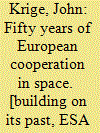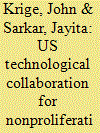| Srl | Item |
| 1 |
ID:
136987


|
|
|
|
|
| Publication |
Paris, Beauchesne, 2014.
|
| Description |
543p.pbk
|
| Series |
Studies in Modern Science and Technology from the International Academy on the History of Science
|
| Contents |
Vol. X
|
| Standard Number |
9782701020297
|
|
|
|
|
|
|
|
|
|
|
|
Copies: C:1/I:0,R:0,Q:0
Circulation
| Accession# | Call# | Current Location | Status | Policy | Location |
| 058166 | 500.5094/KRI 058166 | Main | On Shelf | General | |
|
|
|
|
| 2 |
ID:
114434


|
|
|
|
|
| Publication |
2012.
|
| Summary/Abstract |
The negotiating history of Article IV of the Treaty on the Non-Proliferation of Nuclear Weapons (NPT) is analyzed using previously overlooked archival sources. Contrary to received wisdom, there was a lively debate in the spring of 1968, much of it restricted to behind-the-scenes exchanges between Washington and London, over the proliferation risks of gas centrifuge technology for uranium enrichment. The United States put its faith in classification, safeguards, and peaceful use. The United Kingdom feared that clandestine enrichment using centrifuges would render the NPT a dead letter.
|
|
|
|
|
|
|
|
|
|
|
|
|
|
|
|
| 3 |
ID:
162682


|
|
|
|
|
| Summary/Abstract |
Although the existing international-relations scholarship argues that technological assistance in the nuclear domain increases the probability of nuclear proliferation, the historical account indicates otherwise. Congressional legislation for nonproliferation, economic sanctions, and poor state capacity—specifically, inept managerial capabilities of the recipient state—explain merely part of the puzzle, but overlook the role of positive inducements offered to impede nuclear proliferation. Historical evidence shows that the United States often provided technological assistance with the deliberate intent to inhibit proliferation. In other words, Washington employed its technological leverage to attain nonproliferation goals. American technological preponderance since the end of World War II made such an approach feasible. This study examines key Cold War cases—Israel/Egypt, India, and West Germany—where the United States offered technological assistance with the deliberate intent to stall nuclear proliferation, thereby underscoring the role of assistance for inhibitive ends.
|
|
|
|
|
|
|
|
|
|
|
|
|
|
|
|